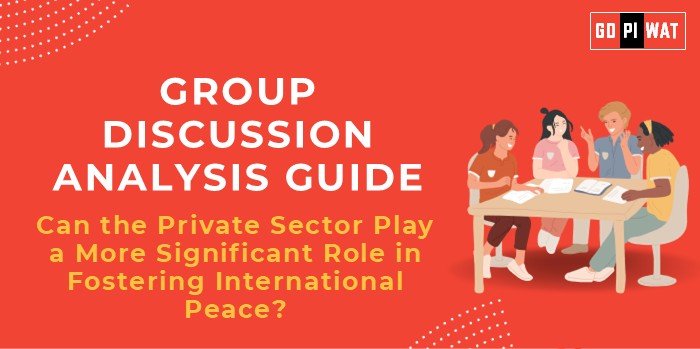📋 Group Discussion (GD) Analysis Guide
🕊️ Can the Private Sector Play a More Significant Role in Fostering International Peace?
💡 Introduction to the Topic
🌍 Opening Context: International peace, a cornerstone of global stability, traditionally lies in the domain of governments and international organizations. However, in a globalized economy, private sector actors increasingly influence peacebuilding efforts through economic development, innovation, and social responsibility.
📜 Topic Background: Historically, peace efforts have centered on diplomatic and intergovernmental initiatives. Recently, private corporations, NGOs, and multinationals have emerged as key stakeholders. From conflict resolution initiatives to sustainable development projects, their role is expanding in both post-conflict and fragile regions.
📊 Quick Facts and Key Statistics
- 💰 Global Business Investments in Conflict Zones: Over $30 billion annually, indicating private sector interest in post-conflict reconstruction (World Bank, 2023).
- 📈 Impact of Economic Growth on Peace: A 1% increase in GDP is linked to a 5% reduction in conflict likelihood (UN Peacebuilding Support Office).
- 🌟 CSR Spending: $19 billion globally in 2023, with a significant focus on education and infrastructure in fragile states.
- 🤖 PeaceTech Innovation: Over 150 startups globally are working on peace-centric technologies, from AI-powered conflict resolution to blockchain for transparency.
🌍 Stakeholders and Their Roles
- 🏢 Private Companies: Driving economic development, investing in infrastructure, and creating job opportunities in conflict-affected areas.
- 🏛️ Governments: Partnering with corporations to design frameworks for sustainable development.
- 🌐 International Organizations: Facilitating partnerships and providing regulatory frameworks for private-sector involvement.
- 👥 Local Communities: Engaging with corporations to ensure initiatives meet their needs and build long-term resilience.
🏆 Achievements and Challenges
🌟 Achievements:
- ✔️ Infrastructure Development: Companies like Coca-Cola and Siemens have contributed to water and electricity access in post-conflict regions.
- 🌐 Economic Integration: Amazon and Alibaba have enabled SMEs in fragile states to access global markets.
- 💡 Tech Innovation: PeaceTech Lab initiatives use AI and blockchain for conflict analysis and transparency.
⚠️ Challenges:
- ❓ Ethical Concerns: Risk of exploitation or exacerbating inequalities.
- 🔒 Security Risks: Corporations face operational risks in conflict zones.
- 📉 Global Comparisons: Estonia’s private-led cybersecurity innovations versus limited initiatives in conflict zones like Yemen.
🌍 Case Studies:
- 🇦🇫 Afghanistan: Mixed success of corporate-led microfinance initiatives.
✨ Structured Arguments for Discussion
- 💬 Supporting Stance: “Private sector innovations have transformed conflict-prone regions by creating jobs, fostering economic stability, and enhancing living standards.”
- ⚖️ Opposing Stance: “Profit motives often conflict with peace objectives, leading to exploitation and short-termism.”
- 🔄 Balanced Perspective: “While private initiatives bring resources and innovation, they must align with ethical standards and community needs for sustainable impact.”
🎯 Effective Discussion Approaches
📖 Opening Approaches:
- 📜 “The $19 billion global CSR spending demonstrates the private sector’s commitment to societal welfare, but how can this be tailored for peace?”
- 📚 “In Somalia, private telecom companies have provided services where governments failed, showcasing their potential to foster peace.”
🔄 Counter-Argument Handling:
- ✔️ Acknowledge ethical concerns but propose partnerships with local governments for transparency.
- 🌍 Cite successful case studies like Rwanda’s post-genocide recovery.
📈 Strategic Analysis of Strengths and Weaknesses
- 💪 Strengths: Resource-rich, innovative, scalable.
- ⚠️ Weaknesses: Profit-driven, ethical risks, uneven impact.
- 💡 Opportunities: Tech-driven peace innovations, CSR expansion.
- 🚨 Threats: Regulatory barriers, conflict escalation risks.
📚 Connecting with B-School Applications
- 🌟 Real-World Applications: CSR strategies, international business ethics, and sustainable operations models.
- 💬 Sample Interview Questions:
- “How can multinationals balance profit motives with peacebuilding goals?”
- “Evaluate the success of public-private partnerships in post-conflict reconstruction.”
- 📖 Insights for Students:
- Research opportunities in CSR, sustainability, and emerging PeaceTech markets.


